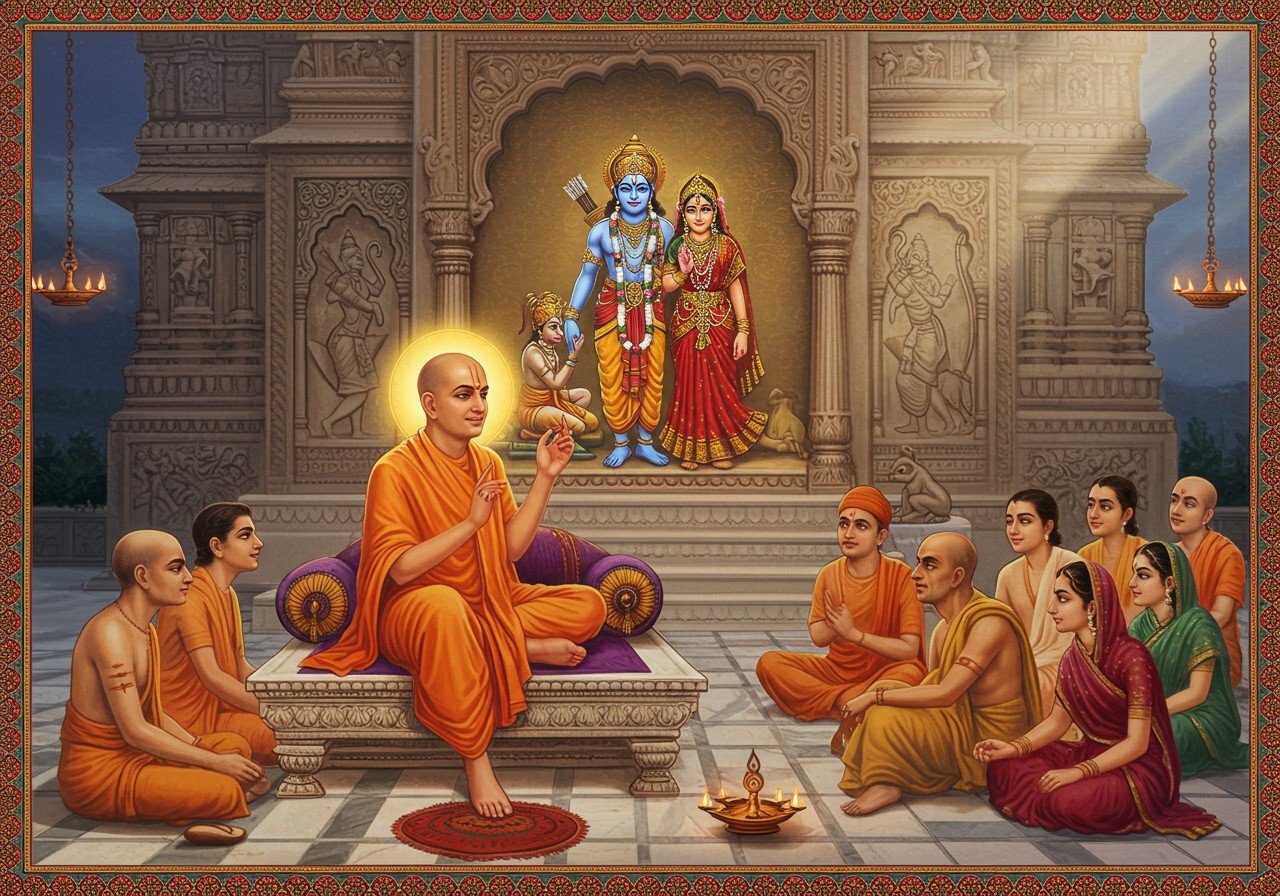Ramananda: A Beacon of Bhakti and Social Reform

Ramananda, a revered 14th-century Vaishnava saint and poet, significantly shaped the Bhakti movement and championed social reforms in India. His profound impact resonates even today. He is considered a founder of the Bhakti movement in Northern India, emphasizing devotion (Bhakti) to a personal God, primarily Lord Rama, as the path to salvation. This challenged ritualistic practices of the time, promoting a direct relationship between devotees and God.
Ramananda’s Devotion to Lord Rama
Ramananda fervently advocated for devotion to Lord Rama, emphasizing Ram Bhakti as a direct path to spiritual awakening. He encouraged a deeply personal connection with the divine, accessible to all regardless of social standing. This contrasted sharply with the prevailing ritualistic practices often limited by caste restrictions. Ramananda believed that true devotion transcended such boundaries, offering everyone a chance to experience God’s grace.
Explore the profound influence of the Ramayana on Hindu spirituality.
Ramananda’s Influence on the Bhakti Movement
Ramananda’s impact on the Bhakti movement was transformative. He ushered in an era of accessible spirituality, challenging the rigid social structures of 14th-century India. His teachings offered a refreshing alternative to traditional practices, emphasizing personal devotion and a direct connection with the divine. Ramananda is often hailed as a bridge between the Bhakti movements of North and South India, unifying diverse spiritual expressions under a shared banner of devotion.
Discover how the Ramayana has profoundly influenced Indian culture.
Social Reforms Spearheaded by Ramananda
Ramananda was not merely a spiritual leader; he was a revolutionary social reformer. He challenged the deeply ingrained caste system, proclaiming that divine grace was available to everyone regardless of birth. This radical inclusivity extended to people of all castes, creeds, and genders. Ramananda’s disciples, including Kabir, a Muslim weaver, and Ravidas, a cobbler, exemplify his commitment to social equality. His teachings, delivered in vernacular languages like Hindi, reached the masses, further breaking down social barriers.
Learn about loyalty and sacrifice through Ramayana friendship lessons.
Ramananda’s Enduring Legacy
Ramananda’s legacy continues to inspire movements for social justice and equality. His teachings on universal love and acceptance remain profoundly relevant in today’s world. His followers established the Ramanandi Sampradaya, a prominent Vaishnava sect that carried forward his message of inclusivity. The sect played a vital role in challenging caste distinctions and championing the rights of marginalized communities.
Delve into the core beliefs and practices of Hinduism for a richer understanding.
Supporting Your Spiritual Journey with Poojn.in
Poojn.in offers a wide selection of products to support your spiritual practice. You can find everything you need to enhance your devotion, from puja samagri to sacred texts. We provide high-quality, authentic items sourced from trusted suppliers. We also provide detailed descriptions and instructions for each product so that you can use them with confidence.
-
Ram Puja Essentials: Find complete Ram Puja kits, copper Ram Darbar murtis, Ram Charit Manas texts, bhajan books and audio, Ram Naam angavastras, tulsi malas, and dhoop and deep samagri.
-
Sacred Texts and More: Explore a wide range of spiritual books, including the Srimad Bhagavad Gita in various languages, to deepen your understanding and practice.
-
Enhance Your Puja: Discover clay diyas, pure cotton wicks, and other essential samagri to create a sacred atmosphere for your rituals.
Embracing Ramananda’s Teachings Today
Ramananda’s message of love, devotion, and equality continues to resonate powerfully. In a world often fragmented by differences, his teachings encourage us to embrace unity and compassion. By welcoming all into a shared spiritual experience, he demonstrated that divine grace transcends all boundaries. His vision inspires us to break down barriers, celebrate diversity, and cultivate a society where everyone is valued.
Understanding Ramananda’s Teachings: FAQs
What were Ramananda’s core teachings? Ramananda’s teachings centered on Ram Bhakti, emphasizing devotion to Lord Rama, coupled with a strong advocacy for social equality and the dismantling of caste barriers.
How did Ramananda promote Ram Bhakti? He promoted Ram Bhakti by making it accessible to all, irrespective of social status. He preached in vernacular languages, ensuring his message reached the common people. He emphasized a direct, personal connection with God, bypassing traditional rituals often restricted by caste.
Why is Ramananda considered a social reformer? Ramananda challenged the rigid caste system, accepting disciples from all backgrounds. This radical inclusivity promoted equality and unity amongst his followers. He championed the idea that everyone, regardless of birth, had the right to spiritual growth and divine grace.
Who were some of Ramananda’s notable disciples? Kabir, a Muslim weaver, and Ravidas, a cobbler, are two of his most famous disciples. They carried forward his legacy of Ram Bhakti and social reform, extending his influence across diverse communities.
How did Ramananda’s teachings impact society? His teachings inspired people to transcend caste distinctions and embrace a shared spiritual path. His emphasis on Ram Bhakti and equality fostered a more inclusive community, challenging the existing social hierarchy.


